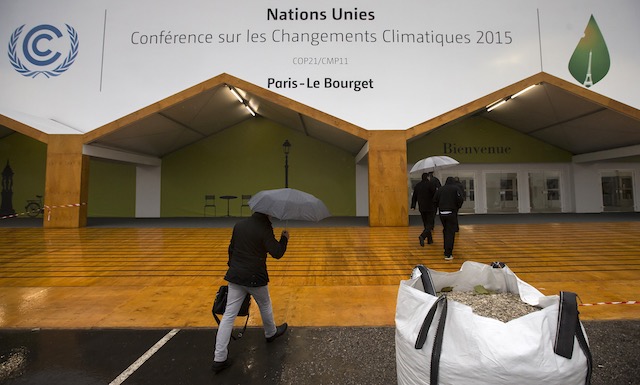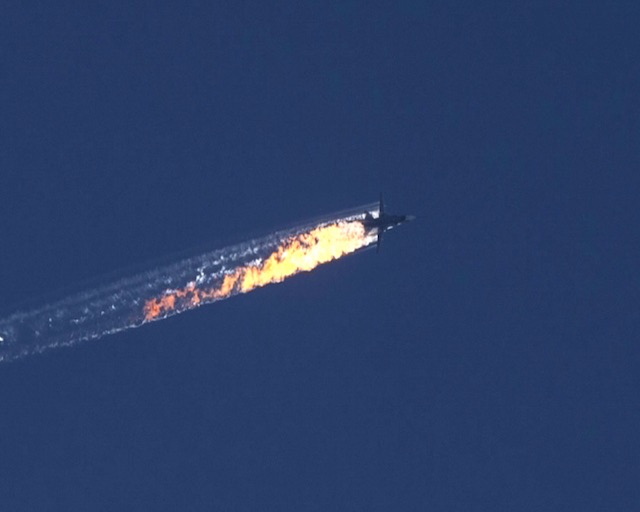![MARITIME SECURITY. US President Barack Obama speaks following a tour of the BRP Gregario Del Pilar in Manila Harbor in Manila on November 17, 2015 after arriving to attend the Asia-Pacific Economic Cooperation (APEC) Summit. Photo by Saul Loeb/AFP]()
MANILA, Philippines – It's been a busy month for the Asia-Pacific as annual summits, the resumption of arbitration hearings at The Hague, and US freedom of navigation patrols put the South China Sea on top of the regional agenda.
What was initially a dispute between China, and the Philippines and other Southeast Asian countries is increasingly becoming global as the US, Japan, and even India voiced concern about China's massive land reclamation. Washington also sent warships and planes to challenge China's claims to maritime rights based on artificial islands.
Leading Filipino maritime law expert Jay Batongbacal told Rappler that the involvement of the US and Japan pushes the Philippines' historic arbitration case to the sidelines in what is now becoming a proxy war among superpowers.
“We're not able to influence anymore the external powers in how they deal with each other. It's just them. They are the ones accusing each other of provocations while we are still in The Hague….The South China Sea and the region are becoming the arena for competition between these great powers,” he said.
What does this rivalry mean for the rest of the region? Rappler sits down with Batongbacal to link the different events with the wider geopolitical picture. The head of the UP Institute for Maritime Affairs and Law of the Sea expects greater military activity, and a heightened contest for resources in the region.
Here is our wide-ranging interview.
![INCREASED TENSIONS. Maritime law expert Jay Batongbacal says tensions are likely to increase in the South China Sea with China using its reclaimed islands, and with the US sending freedom of navigation patrols. Photo by Ayee Macaraig/Rappler]()
You've said that China's reclamation influenced the tribunal to decide to hear the case. How does the island-building impact on the arbitration case?
Clearly, the reclamation has brought the case into focus for the tribunal because China's actions really challenge international law. Can you imagine, while a case is pending, activities are undertaken which directly contradict the norms of international law with respect to how you're supposed to take care of the marine environment, and how states are supposed to conduct themselves if there is a dispute pending?
So if China continues all of these actions, naturally, those actions would bring to question the entire system of international law. I would think the tribunal would have been, at the very least, motivated to act on the case. They themselves as arbitrators would also be concerned about their own reputation, their own institution being called into question by these kinds of activities.
In the recent APEC and ASEAN summits, more world leaders and countries supported arbitration while expressing concern about China's reclamation. What impact does this have on Beijing?
Let's put it this way. China has never bowed to international pressure. All you need to do is look at Tibet. Look at all the human rights issues being raised against China, the dissidents. So in that sense, I don't think we can expect compliance based on international pressure.
What it does however introduce is it's like sowing winds of change in China. That people there become more aware, especially decision-makers and policymakers, that they need to be more careful in their policies and activities towards the region. That will cause them to take different tracks on their strategies, on their dealings with these other countries, and that is where the change will come from.
Now, any change that comes through that process is going to take a lot longer, again as you've seen with Tibet, it's been decades and we've not seen any major change really. But with respect to say the economy, the openness of their economy, we've seen some interesting changes. I don't expect it to make a significant impact at this point. Any effect it might have would be more long-term.
The Philippines and Vietnam signed a strategic partnership on the sidelines of the APEC summit in Manila. How does this alliance affect the way they handle the dispute?
For the Philippines, it is important for it to have a partner so it does not stand alone in the disputes. China would not want these two countries to become full-blown allies, especially from a military standpoint. In the sense that it gives the Philippines a little more leverage against future Chinese assertions, it's good.
For Vietnam, it's very important, and it's even more leverage for their part because Vietnam has been quite adept at using all of the means available in bringing them to bear on the dispute. So everything from diplomatic to legal, they've been able to employ.
Now with the arbitration case, the award on jurisdiction, that's an additional legal tool they have. A strategic partnership with the Philippines will add an element of military coordination, which is important because the Philippines is a treaty ally of the US. Therefore, there is a linkage formed, and that's something China will definitely be very concerned about. So it really helps both of them.
![STRONGER TIES. The Philippines and Vietnam, both claimant countries in the sea row, improve their military coordination by signing a strategic partnership. Photo from Official Gazette]()
China says it will continue its reclamation activities while the US plans to pursue its freedom of navigation patrols. How do you see this playing out? Won't this escalate tensions in the region?
Yes, it does chiefly because China responds to the US and not to anyone else. It's the US and Japan that make them react. Where is this all going? Well, the reclaimed islands will stay there. They're not going to pack up and leave. From those islands, China will begin to extend the resource extraction and exploitation activities that they're already undertaking.
Because of the military potential of those islands, the US and its allies will probably ensure that they will always have more military assets within the vicinity. That includes freedom of navigation patrols. So you will see the South China Sea becoming more congested in terms of these activities. So in addition to all the shipping that's projected to increase over the next few years, you will also have increased military presence.
If the Philippines loses its case, I think that then it will take a geopolitical turn towards fully exploiting the US alliance. A return of the US military bases is not out of the question at this point – a full return, not just under the Enhanced Defense Cooperation Agreement.
If it wins, the fact that China will not comply with the judgment, China will probably increase or continue its current course of increasing its exploitation uses of the South China Sea. That will cause the countries to again turn to the US as well as other allies – Japan, EU, and Russia – to try to keep balancing the military weight of China.
In terms of the resource activities, that's where we'll probably see some trouble brewing because the only response possible is for the other countries to also increase their resource exploration, exploitation activities; otherwise all of that will be siphoned away by the massive activities of China. We're still looking at the possibility of greater friction, greater potential disputes between different countries, especially in terms of resources.
Ultimately, the loser will actually be the South China Sea – not even the countries but the sea itself. We're going to see those resources subject to the so-called tragedy of the commons because every other country will be racing to try to exploit its resources before the other one does.
![SIDELINED ISSUE? Batongbacal says the Philippine arbitration case against China is being sidelined as the US plays a greater role in the sea row. Photo of the Philippine delegation at The Hague from gov.ph]()
You've said the Philippines is losing control of the dispute to the US and Japan. What do you mean by that?
Already we're seeing that events concerning the South China Sea are being influenced not by us directly but rather by the US and Japan and China. They're all reacting to each other, and even the arbitration case is becoming a side issue.
If you look at the week during the time the award came out, and you notice what was being reported, the award was there but they were also talking about the US freedom of navigation patrols. Subsequent to that, they're talking about how China is reacting to the patrols.
'ASEAN [leaders] should be the ones who can tell what happens and does not happen in the region. Obviously that's not what's going on right now. Rather, it's the external powers dictating the situation.'
- Professor Jay Batongbacal, UP Institute for Maritime Affairs and Law of the Sea
So it's like the arbitration case is now like on the sidelines, like a bystander, while these things are happening. We're not able to influence anymore the external powers in how they deal with each other. It's just them. They're the ones talking about what to do, what not to do. They are the ones accusing each other of provocations while we are still in The Hague.
So it is now becoming a contest between superpowers?
Yes, and it's actually a concern shared by the rest of the region. Our discussion with academics elsewhere indicate that they're also thinking along those lines.
The South China Sea and the region are becoming the arena for competition between these great powers. That is the biggest concern of Indonesia, Malaysia, for example. They do not want that to happen. Vietnam does not want to see the South China Sea becoming a Chinese lake, neither does the Philippines or say Malaysia, Indonesia.
But more important, they do not want this to become a battleground between external powers because that's what happened in World War II. Ultimately, who suffered? The inhabitants. That's what they don't want to happen. That's why they are very concerned.
![ASEAN CENTRALITY? Observers say ASEAN must become more active in resolving the South China Sea dispute so the region will not become an area for the contest of superpowers. Photo of the ASEAN summit in Kuala Lumpur, Malaysia by Lauro Montellano Jr/ Malacañang Photo Bureau]()
How then does the region avoid that?
That's where ASEAN (the Association of Southeast Asian Nations) and its centrality come in. Theoretically, what should happen is it should be the countries that are resident in the region that determine the state of relations between them, as well as the state of relations between the external powers that are involved or have interest in the region.
After all, it's their area. It's their place. They should be the ones who can tell what happens and does not happen in the region. Obviously that's not what's going on right now. Rather, it's the external powers dictating the situation. – Rappler.com
![]()


































